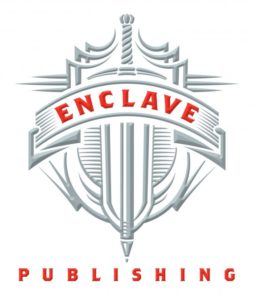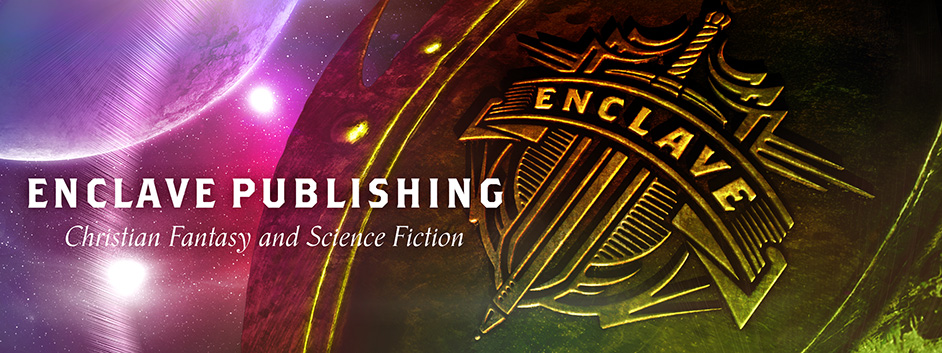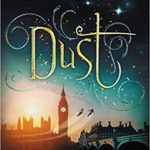Steve Laube on Marcher Lord Press Regenerating Into Enclave Publishing
Fantastical-fiction publisher Marcher Lord Press.1 has had quite a fantastic quest of its own since author and editor Jeff Gerke started the independent publisher in 2008.
From Marcher Lord’s presses have come award-winning fantasy, science fiction, space opera, paranormal, steampunk, dystopian, parody fantasy, spiritual warfare, and more. Each novel has come from a professing Christian author yet is intended for any sort of reader. And so far you can’t find them in bookstores — MLP has been an online-only deal.
Then owner/founder Gerke sold the publisher on Jan. 1 to Steve Laube, speculative-fiction fan, finder of many Christian authors of fantasy and sci-fi, and literary agent for other genres.2 Fans who keep track of these things wondered what would happen to the prominent publisher of many of their new favorite novels. Days later Laube provided assurances like this:
MLP has been and will continue to be the premier publisher of Science Fiction and Fantasy for the Christian market.
Laube also answered questions here at SpecFaith. Today he returns for another interview.
ESB: What led to your interest in publishing Christian speculative fiction?
Steve Laube: I’ve been a fan of science fiction and fantasy since I first read the Pellucidar and Barsoom books by Edgar Rice Burroughs in high school. In the 90s and early 2000s, during my tenure at Bethany House Publishers as an acquisitions editor I helped bring the genre into the CBA market with authors like Karen Hancock, Kathy Tyers, Randy Ingermanson, and John Olson.
From an industry perspective I’ve been a part of the genre for over 30 years going back to my days as a Christian bookseller in the 80s.
ESB: Last weekend you attended the Realm Makers conference and announced updates about MLP. How did fans react? Any other thoughts about the conference?
Steve Laube: The reaction to the announcement was electric. There was a lot of support and encouragement. There were a few who missed the original announcement and talked to me about the change. But once they heard the vision for Enclave Publishing the objections disappeared and they became enthusiastic about the future.
ESB: After the April poll with suggested changes, what led to the new name Enclave?
Steve Laube: The name change idea goes back to before I bought the company. At the time of purchase I thought it best to wait to consider that option and instead focus on infrastructure and overall strategy. In the Spring I went to a conference with the idea of privately asking a dozen industry friends about a possible name change. Some of them are very much inside the Speculative Faith community and others were not. To my surprise 100% thought it was a good idea. I also talked with Jeff Gerke about the name change idea and he wholeheartedly embraced it.
But to see if the opinion would extend into a larger audience I decided to try a survey of various names that had been offered as possibilities. Nearly 600 people gave their opinion. The bottom line was that the majority felt there should be a change even if there wasn’t 100% agreement on what that change should be.
This made it clear that a change was warranted and I commissioned a designer to create the logo and banner artwork.
ESB: What will readers find the same or improved after MLP becomes Enclave Publishing?
Steve Laube: Most of the changes so far are behind the scenes. Accounting, acquisitions, editorial, and production schedules. The books we are publishing continue to be among the best our industry has to offer in the genre.
ESB: What would you say the greatest difference(s) are between MLP and Enclave Publishing?
Steve Laube: This is a difficult question to answer. Jeff Gerke did an amazing job with Marcher Lord Press and his legacy is secured. Ultimately, like most publishers, it comes down to the likes and dislikes of the person making the acquisition decisions. So to answer the question directly, the difference is the difference between Jeff and Steve. But I doubt many will be able to tell the difference because both of us have the same vision: to publish amazing and fantastic stories in the speculative fiction genre.
ESB: To some fans, the new name seems to reinforce negative perceptions of Christian fiction — some of which you addressed in your Monday announcement. Any further thoughts on that?
Steve Laube: I think I addressed that rather succinctly in the original announcement.
I am of the opinion that few readers know who publishes their favorite authors.
For example, who can name the publisher of Jim Butcher’s “Dresden Files” books? Or who publishes Brandon Sanderson or Ian Douglas? Or in the Christian market who publishes Patrick Carr, Donita K. Paul, Ted Dekker, or Homer Hickam?
My point is that it is the author and the book itself that carries the day. In the end the publisher is the vehicle by which these great writers are able to get their books into the hands of their readers.
The publisher’s name has meaning, of course, and that is part of branding. The creation of an expectation of quality and exciting stories. The name Enclave Publishing does not suggest anything negative about Christian Fiction.
Online bookselling reduces the visibility of the publisher even further. You have to scan down the page to even find the name of the publisher.
 ESB: From a theological perspective, any thoughts about “Christian fiction” and “general fiction”?
ESB: From a theological perspective, any thoughts about “Christian fiction” and “general fiction”?
Steve Laube: I take this as a very serious question and one that is not be considered lightly.
The fear of many is that anything labeled Christian Fiction means it is “lazy,” “preachy,” “shallow” or worse. It has been an unfair connotation the category has fought to counter for the 30+ years I’ve been in the industry. It is usually delivered by those who either have not read anything by a great Christian writer or someone who simply does not like a particular genre (like romance novels).
The irony is that the general market has the same type of novels in their catalogs but you don’t hear the same critique.
In my opinion there are two ways Christian fiction is different from general fiction. First is that the author is writing from a Christian worldview that permeates their stories. Second are the underlying themes that can be found in the best Christian fiction. There are themes of Hope, Redemption, and Truth. This does not mean there is a salvation scene in every book. It doesn’t mean that every character has to have Bible verses on their lips when crisis happen. It does not suggest or require there to be a forced message in every story.
Every novel has a “message” whether written for the general market or the Christian market. That message might be existentialism (see Camus or Kafka) or any number of things. It is fascinating that Christian novels are penalized for carrying redemptive themes while novels in the general market are not penalized for themes of a much darker nature.
The readers of this blog enjoy the philosophical dialogue with regard to the content of Christian books. That is a healthy and necessary conversation. The challenge comes in that every person has their own understanding which supports their opinions. And it is that understanding they bring to every book they read whether it is from a Christian publisher or not.
My theology professor in college once told me, “Theology 101 is the only class in the school where every student arrives knowing all the answers before they hear their first lecture.” And his observation can be applied to every reader of fiction.
Each one not only brings their philosophical or theological opinions, they also bring their personal preferences: too much romance, or too much violence, or the wrong point-of-view, or a myriad of other things that paint a different picture for that reader.
My hope is that the great books that were published in the past will be a foundation upon which Enclave Publishing can build. Books that capture the imagination and take the reader to a place they have never visited before. And when they are done they may have thought about something bigger than themselves for a moment and somehow be a different, if not better, person for it.
ESB: Finally, I must re-ask some of Rebecca LuElla Miller’s questions from Jan. 7:
What do you hope to see for Marcher Lord Press down the line? Are you hoping to expand the number of titles (in other words, do you see speculative fiction for the Christian market as a growth industry)? Would you consider moving […] toward traditional publishing so that MLP books might appear on bookstore shelves?
Steve Laube: That is the area of greatest growth potential for Enclave Publishing. We will make every effort to get our books into the stores.
For now we will plan for 10 new releases per year (five in 2014). That may expand, it may not. Much will depend on the quality of authors we are able to acquire and develop.
We already have signed bestselling author Ronie Kendig to write a three book Fantasy trilogy for us (first book out in fall 2015). Our hope is that this will be the beginning of many years of publishing great books by great authors.
ESB: Thanks much for your time, Steve.
- Find all available Marcher Lord titles in the SpecFaith Library, or track MLP news at SpecFaith here. ↩
- Read more at Marcher Lord Press Regenerates, Jan. 1, 2014. ↩










































So let me get this straight. A publishing house’s branding is so important that it’s worth sacrificing one’s name-recognition in order to procure a marginally-improved ident, but also so inconsequential that “few readers know who publishes their favorite authors.”
Hm.
Good point. The mainstream sf/f publishers definitely attempt to promote their brands among the readership. Tor does plenty of marketing, and it’s mountain logo is iconic. Same for DAW, Ace, ROC, DelRey.
I know that when I was a teenage boy and I knew a couple other teenage boys who were in to fantasy — and we were reading The Wheel of Time — the Tor name and logo meant a lot to us.
The name and logo of Marcher Lord Press meant a lot to me too. I discovered Marcher Lord Press one fateful day on the Internet, and I thought the company’s brand presentation looked cool. (Jeff Gerke was pretty good at marketing, whatever he may have said.) Over a few years, I bought a few books, and I got involved in the Anomaly forum that was related to Jeff Gerke’s older website WhereTheMapEnds. That’s how I eventually ended up stalking Speculative Faith and random people’s blogs.
Austin makes a good point, and I agree, it’s one or the other.
I, also, back in the day, looked for Daw and Ace and Berkely–some imprints meant you could trust them– and nowadays I still look at Tor titles.
Baen. Orbit. Del Rey.
BUT…I never liked the name Marher Lord Press. So, really, I was hoping for a cooler name change. I’m not wild about Enclave, but it’s one word and whether we like the connotation or not, at least it GIVES a clear connotation–which MLP didn’t to most folks. I bet many had to look up what a Marcher Lord was…
When I think of the SF imprints I enjoyed, they tended to be one-word names with clear visuals. Tor has that mountain peak. DAW had the yellow box and stylized font. ACE evolved, but it was still short/sweet and sometimes the A as the icon, stylized to be a mount or pyramid of sorts. Orbit with the planet and moon. Harper had PRISM (forget what the logo was, though wild guess–a spectrum? Prism?). Roc with the stylized mythical bird. Pyr with the pyre/flames. Baen with the spaceship/dragon.
Even the ones with more than one -word title names generally didn’t venture to THREE words: Del Rey (stylized letters within a circle–planet-like). Harper Voyager (crescent moon.)
Look at how simple the visuals tended to be. Planets. Moons. Mountains. Fire. Mythical bird. Spaceship. Dragon.
That’s one reason I never liked Marcher Lord Press–long, unwieldy, and no simple image to convey it.
Enclave. One word = good. Image maybe exclsivistic. Logo aggressive. But, hey, it conveys more strongly than MLP.
I still wish it had been simpler, punchier, and more SF related than sociological. Best I recall, I voted (not enthusiastically) for Aeon among the choices the Laube survey offered.
If I were in Steve’s position, having just bought a company strongly associated with a particular individual and approach and wanting to take it in a slightly different direction, I’d change the name too. I think it’s a mistake to read too much into the decision or expect the name to encapsulate everything about the publisher’s philosophy. I don’t think it’s going to hurt readers or authors for Marcher Lord to become Enclave, even if I personally would have preferred Aeon (one of the other possible choices) as I think it more positive in tone.
I thought Aeon was better, too.
The question was whether the new name reinforced negative perceptions of Christian fiction in general. Taken out of context my answer is contradictory.
The name change was not done in a cavalier manner. As mentioned in the above post it was only done after careful consideration, including asking for input from the fan base.
I only ask that we be given the chance to show that our books continue the fine tradition of the past.
You can certainly count me among those rooting for the success of Enclave Publishing. I hope you’re able to produce and promote a slew of exceptionally excellent novels, and I’ll likely be reading some — hopefully, many — of those novels in the future. With that said, though, your stated reasoning on this issue still doesn’t make sense to me.
On one hand, you assert that the name and logo of Marcher Lord Press weren’t living up to their potential. Personally, I’d agree with that assessment. All well and good. But then you dismiss fan concern over the new title and logo (and I’ve personally seen a lot of concern expressed in online circles) by saying that branding doesn’t really matter — that, in the end, “few readers know who publishes their favorite authors.” But while I’d agree that a novel stands or falls based primarily on its own qualities, and that the reputation and popularity of a great novel can easily transcend that of its publisher, your statement seems to fly in the face of your stated reasoning for transmogrifying the MLP brand. If fan reaction to a publishing house’s name just isn’t that important, then why conduct a poll to test said reaction before switching up said name?
Speaking of the poll, I obviously haven’t seen the result thereof, and am thus unable to opine thereon. 600 respondents does seem like a pretty decent number, so I’m sure you were able to get a relatively representative picture of Christian spec-fic fan sensibilities on this issue. And while the community of SpecFaith commenters is certainly non-representative in any scientific sense, I think the visible reaction to your poll on this site is quite telling. By my count, six commenters disliked all options provided, three more specifically disliked “Enclave,” two expressed neutral feeling toward the word, and only one person liked it. That’s a three-to-one ratio of negativity.
Now, that may mean little in the grand scheme of things. I disliked “Enclave” as a brand option, but I’ll eventually get over that negative perception if the novels you publish turn out to be consistently good. It just seems dismissive to me to write off fan dissatisfaction as ultimately irrelevant, which is what you appear to have done.
It’s really a moot point to be griping after the fact so feel free to ignore this post. o:)
I’m sure I’ll get used to Enclave eventually and, hopefully will even like it one day. But just saying “The name Enclave Publishing does not suggest anything negative about Christian Fiction” isn’t addressing the question/concern/argument and neither does implying that it doesn’t matter because most people don’t pay attention to the publisher anyway. 😛
Marcher Lord sounds like we’re venturing out and Enclave sounds like we’re hunkering down. I love gathering places and havens as much as the next person but I just don’t think it is the aspect that should have been focused on. It carries opposing connotations to the original name.
But hey, what’s done is done. And the sword-pen is very geeky cool. 🙂
I tend to think the brand isn’t necessarily connected to what the logo means. For instance, I don’t know what DAW, Ace, or ROC “mean.” I know what they stand for.
I think that can be true for Enclave Publishing. I was one who thought it gave the message of separation, but it doesn’t have to—not if the EP books end up in book stores and the marketing draws new readers.
Becky
Yes, yes, yes. Total double standard. I don’t like to hear Christian authors saying they don’t put themes into their books–they just let their worldview seep in. Others are very intentional in putting anti-Christian themes into their books, but many Christians have come to believe they shouldn’t put messages into their books or they’ll be preachy.
Becky Miller brilliantly asks, “If you carefully craft characters and plot, why wouldn’t you do the same with theme? Why just let that important part of the story seep in?”
We don’t need to stop putting in messages. We need to learn to put them in well. And many Christian writers are doing that.
On the name issue–I don’t care as much what a company is called as I care about what kind of product they put out. But I have to say, I LOVE the Enclave logo. Very nice.
There are only two SF publishers that I immediately think of as “the publisher that publishes so-and-so.” In one case, this is good: Baen Books publishes one of my top favorite authors, who is only published elsewhere because fantasy isn’t really Baen’s core business, and enough not-quite-as-good-but-reliably-enjoyable authors that I’m generally willing to pick up and dip into anything published by Baen that’s by an author I don’t recognize. And their “Baen Free Library” and (once-)freely-distributable CDs—giving their less-profitable backlist away to try to “hook” fans—has earned them a lot of goodwill. In the other case, it’s not good: I know that Tor published Robert Jordan because for a time (a little before my time, but I heard about it, read old message-board posts about it, etc.) the bindings of the Wheel of Time paperbacks were notoriously bad, so that a reader might have to go in with glue to repair a book to be able to finish reading it for the first time.
All that to say, I only pay attention to who publishes an author—or a book—in the most exceptional of cases. More commonly, I pass over books on bookstore shelves with a sigh of “Yet another of those” when I see a particular style of cover. What can, I think, get me to consider buying (“consider” because my income doesn’t support much in the way of books for myself) any given book is to advertise it with blurb and cover or, preferably, an excerpt in a similar book that I really, really liked. (And, by the way, I can probably count on the fingers of one hand the speculative fiction I’ve read in the last ten years that I knew could be called “Christian fiction” that I really, really liked, and at least one of those was self-published.)
I’ve known about the Baen Free Library for years, but I’ve never taken advantage it — that’s the problem with living in cyberspace. Too much free content, too much distraction, too little time.
So, I just searched it; it’s still up. I’ve downloaded On Basilisk Station from there before because I’ve heard about it. Anything else I should read from the Free Library if I ever have time?
It’s “again” up, rather than “still up”—when Amazon started matching ebook prices (and paying royalties based on that price) on any other major ebook outlet, they took the Library down until they had worked out a response that wouldn’t prevent them from getting any revenue on the Kindle platform. (Which turned out to be reissuing all the books in question in separate editions, if I understand correctly.) Unfortunately, it is somewhat reduced from its former state.
I haven’t read On Basilisk Station myself (it’s on my list of books I want to read sooner than “eventually”). The books from the Free Library I would recommend are 1632, In the Heart of Darkness (except that it’s the second book in a series of four; the first was in the Library before the Amazon incident), and With the Lightnings (which is also the second in a series, but I haven’t read the first and don’t think my enjoyment was harmed by that). And any of the Andre Norton that strike your fancy (the few books of hers I’ve read I thoroughly enjoyed).
Thanks.
I don’t think the name will matter much in terms of branding. The worst thing you can say about it is that it feels generic. Then again, generic isn’t always bad. Sometimes you don’t want the logo and brand to overshadow the product, or pigeonhole you into a specific model.
What will matter are the kind of books Steve publishes, and in this case, it’s really a “Hurry up and take my money” sort of thing. I think that we’re microanalyzing things like this (and I am guilty of it too) because there isn’t much else to go on for news. Once more information about the books comes to light, then we’ll see how it goes.
The logo looks cool. I personally would not have chosen Enclave for a name. Too much connotations of focusing inward rather than outward. I don’t think ignoring that negative is healthy. It doesn’t have to define the company, but does mean it can generate some negative feedback to overcome in some quarters.
But as been said, the main branding will happen by the kind and quality of what is published. Most people don’t pay attention to who publishes a book. I agree with that to a point, if we’re talking about generic reader hearing about a book or browsing on Amazon or a bookstore.
But also it needs to be taken into account the unique situation the company is in. That is, it is one of the few well-known publishers of Christian Spec-Fic. MLP is often the first publisher mentioned as a place to get good Christian Spec-Fic. So, at least among Christian spec-fic fans, MLP/Enclave is not as invisible as say, some imprint of Bethany House, or even S&S where they are one among many options.
That said, I wouldn’t expect the name to be bad overall. I’ll get used to it. What comes off the presses will have a greater influence upon defining what the company is about than a name. I look forward to seeing where it goes.